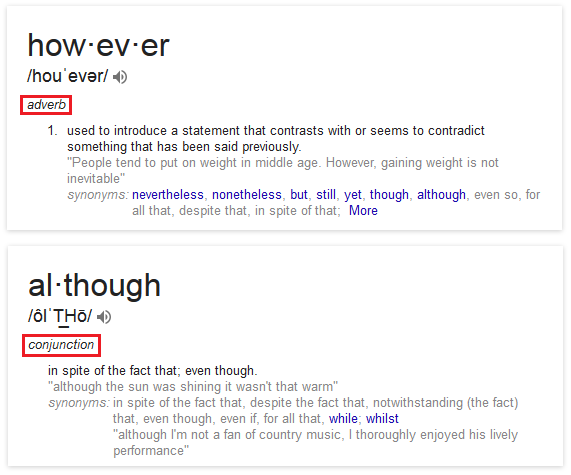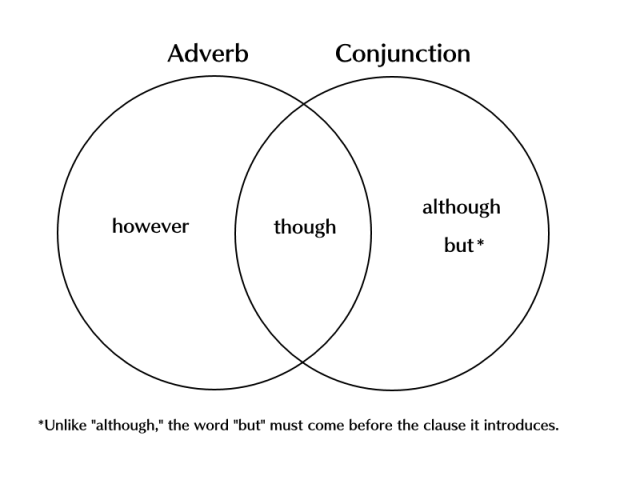Want some more translated porn? Too bad, because y’all gonna get a well-needed lesson in grammar today.
In recent months—and in many months theretofore, but only now have I had time to get sufficiently angry—I’ve witnessed errant, erratic, erroneous usages of certain words that express contradiction/contrast in the English language. Allow me to launch vitriolic criticism at everyone, then offer some constructive criticism so that these infamies I speak of shall never again occur. I’m sure the Oxford comma is about to become universal by my efforts, so this endeavor should be no less successful.
NOTE: Example sentences in green in this article are correct, those in red are incorrect, and those in neither serve some other purpose. Also, there is a sort of tl;dr at the end for the minority of you who don’t have time to set aside for grammar.
The four words under examination today are “but,” “though,” “although,” and “however,” but primarily the latter two. There are other words of this nature, such as “despite” and “whereas,” but they don’t quite tie in to the following complexity. I will begin with the factual basis of my outrage:

The word “however” is an adverb and nothing else, and the word “although” is a conjunction and nothing else. Incidentally, “but” in this context is a conjunction and nothing else (but works slightly differently from “although”), and “though” is both a conjunction and an adverb.
Why is all this important? Because we often torture our eyes with such sentences as:
“I like pancakes, however I also think waffles are great.”
While breakfast aficionados would agree that the semantics of the above sentence are correct, the grammar is not. The word “however” is being used as a conjunction, connecting two independent clauses, and as I’m sure you recall, “however” is an adverb alone. As a rule of thumb, if you can change the word “however” to a conjunction that connects two independent clauses, like so:
“I like pancakes, and I also think waffles are great.”
then the use of “however” is grammatically incorrect, because the above sentence implies that the word in that position is to be a conjunction. Here are some examples of correct usages of the word “however”:
“Jeff likes pancakes. However, I prefer waffles.”
“Jeff likes pancakes; I, however, prefer waffles.”
“Jeff likes pancakes. I smacked him across the face, however, and asserted my preference for waffles.”
This seems simple, but luckily we have something to complicate it. The word “however” has a completely different meaning from its use as a contradictory word, which OAD defines as “in whatever way; regardless of how” or “to whatever extent.” For example:
“However much you try, you will not convince me that pancakes are superior to waffles.”
While this form of the word “however” is also an adverb, its grammatical function is slightly different from that of the contradictory “however.” I won’t force you to wrap your mind around this concept, but all you need to do is recognize which form of the word you’re using, and in the case of the contradictory “however,” delineate it with a comma or commas. If you don’t employ commas regularly, then:
“However the verdict is…”
a reader won’t know what the meaning used in the above phrase is. You will probably be able to determine it from the rest of the sentence, but oftentimes there can be quite a distance to go until you reach that part of the sentence. Moreover, there probably exists some sort of hypothetical sentence structure that I don’t feel like thinking about in which a full sentence can be ambiguous due to the two meanings of “however” commaless.
And now onto “although”! Wait, I just realized that I’m not being vitriolic enough. Time for an intermission.
I HATE ALL OF YOU.
The word “although” is only a conjunction, as stated earlier. So, just as “however” is often used erroneously as a conjunction, “although” is often used erroneously as an adverb:
“I love pancakes. Although I do like me some waffles.”
“I should cook pancakes. Although, waffles would work too.”
No. The above sentences would be best off with “however” instead (so long as you make sure to add a comma in the first one). Or you could change them so that “although” actually does function as a conjunction:
“I love pancakes, although I do like me some waffles.”
“I should cook pancakes, although waffles would work too.”
This seems marginally demanding on the mind, so I have a solution for the two of you who are lazy but read this shizzle anyway. Recall that the word “though” is both an adverb and a conjunction, so you can use it in times of confusion:
“Bob likes pancakes, though I wouldn’t be surprised if he were really a filthy waffle lover.”
“Bob likes pancakes. Though, I wouldn’t be surprised if he were really a filthy waffle lover.”
Just remember to place commas where appropriate. For example, let’s say you neglect one here:
“Bob likes pancakes. Though I wouldn’t be surprised if he were really a filthy waffle lover…”
As in that sentence earlier with “however,” I have an ellipsis at the end because if somebody were known to always neglect commas after the word “though,” then we wouldn’t know whether it’s being used an an adverb or a conjunction from the beginning of the sentence. It could be either:
“Bob likes pancakes. Though I wouldn’t be surprised if he were really a filthy waffle lover.”
or
“Bob likes pancakes. Though I wouldn’t be surprised if he were really a filthy waffle lover, I think he’s a loyal pancake supporter.”
The first sentence uses the word “though” as an adverb, but it is only when we get to the end of the sentence that we realize it. The second sentence uses the word how it should be used judging by the absence of the comma: as a substitute for “although.” To recap, adverbs should be safely nested in their own commas, whereas conjunctions don’t need to be.
By the way, we aren’t done with “although” yet. One might assume that it works the same way as “but” due to the fact that each of the words, as I mentioned earlier, is a conjunction and nothing else. However, unlike “although,” “but” can’t be used at the beginning of a sentence—at least, not in the same way.”Although” and “but” both imply that there is more than one independent clause. However, “although” can come before the first independent clause or the second, whereas “but” can come before only the second. For example, the two words fulfill the same role here:
“Joe likes pancakes, although I like waffles.”
“Joe likes pancakes, but I like waffles.”
But they aren’t equivalent here:
“Although Joe likes pancakes, I like waffles.”
“But Joe likes pancakes, I like waffles.”
This isn’t to say that the word “but” can’t come at the beginning of a sentence. It can, but for a different reason, which is the same structure that many other conjunctions assume:
“Joe likes pancakes. But I like waffles.”
“Joe likes pancakes. Yet I like waffles.”
“Joe likes pancakes. And I like waffles.”
In a world of perfect grammatical logic, the above sentences might be considered sort of incorrect, but I’m sure you will find that this structure is quite inevitable, especially in such cases as dialogue. If you need to recognize the above usage of these words for some reason, just determine whether you can connect the preceding sentence into one:
“Joe likes pancakes. But I like waffles.” –> “Joe likes pancakes, but I like waffles.”
This note on the word “but” is important because we have to take care not to use “although” in the same way. Take this sentence:
“Joe likes pancakes. Although I like waffles.”
In such structures, the “although” would immediately spur the misinterpretation that the sentence will contain two independent clauses.
Too long; didn’t read; I have porn games to get to
I attempted to structure the above in a… structured manner, but the four words described are connected in manifold, asymmetrical ways that make doing so difficult. So, after this convolution, you might hate me more than you previously did, in which case 1) go fornicate with a cactus, and 2) I’ve made a Venn diagram to summarize.
Again, the four words have “It’s complicated” relationships with each other, so I’m leaving out some things (especially with regard to commas) in order to make this a rightful tl;dr:

I’ve suppressed much of the rage I sought to express, but I hope that my introduction of this issue to you will give birth to enough rage to make up for it in the future.
Good post, clear and easy to understand examples.
LikeLike
I am guessing you are/were an English major in college?
LikeLike
No, I’m a homeless guy sitting in a cardboard box outside Mickey D’s for free Wi-Fi. I shall not cease this lifestyle until all of the English-speaking world are aware of their sins.
LikeLike
is that not one and the same? :3
LikeLiked by 1 person
Then i advice you to dig a hole beside you, that when you finally keel over, you would have a grave. Either that or desist from your pointless leeching and go spread your love for proper English.
LikeLike